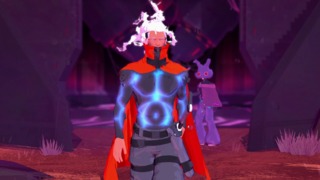
People often ask me what I think the industry will be like in five years, and I answer that if I knew, I’d get bored and leave. If you would’ve told anyone in 2010 what games would look like in 2016, you’d probably get laughed at. In 2016, consoles are more like mobiles, with multiple hardware devices sharing SDK. Mobile is more like console, with pre-orders and connections to TV’s. PC has no idea what it’s doing, but I guess no one is really in charge of PC, so that’s no surprise. Nobody has fully figured out VR yet, and in the meanwhile AR and MR are somewhere around the corner. It’s all rather incredible.
In 2016, the industry finds itself at a strange impasse. As an economy, this industry is hitting a lot of records. As a community, we’re slowly improving our diversity, our ability to deal with toxicity and harassment, and our support structure for developers from countries outside of the traditional game-making world. As a culture, we have seen some of the most impressive gameplay and game narrative ever this year.
I can’t help but feel that the AAA industry is feeding off of the last remnants of ancient IPs, with only a few new titles punctuating a steady drip of rereleases, remasters, and sequels targeting the nostalgia of the audience that has so far kept the traditional AAA blockbuster alive. On the other hand, if there’s anything you can’t accuse the behemoths of our industry of, it’s a lack of genuine enthusiasm: it felt like each blockbuster might be the magnum opus of its series, with no effort or money spared.
In the independent space, my home, the battle for visibility rages on amongst increasingly polished titles with increasingly large budgets. “Indie” in 2016 is barely recognizable from the frustrated counterculture making games for the hell of it in 2010, and while I must admit a certain fondness for that period of time, the games that the scene produces today are of such quality and relevance to the medium, that I don’t think I’d ever wish to go back.
As the mobile space earns more and more each year, with a projection that it will earn more than PC and console in 2017, I can’t help but feel that 2016 might have been the end of an era, and the beginning of a new one. Microtransactions, loot boxes, and gachapon mechanics have snuck their way into some of the most popular AAA games of today. Infinite replayability in the Twitch-era almost comes for free for online multiplayer games, and eSports are an enormous part of games culture in 2016. With the increasing pressure of the finances of blockbuster games, I feel like we’re going to see much more of that in the future.
Oh, and before we get started, I didn’t like how the action feels in Overwatch. It’s brilliant game design, it’s a perfect blend of genres, and it’s a piece of craftsmanship, and it has well-designed, diverse characters, and it has gorgeous aesthetics. You should absolutely play it--and it’s not in my list.
So, let’s go. 2016 - the ever-odd transitional year full of masterpieces.
Best Game: Final Fantasy XV (XB1, PS4)
I’ve been hoping for a road trip game for almost a decade, and this is the first open-world game where the controls encourage and allow you to drive a giant world according to the law.
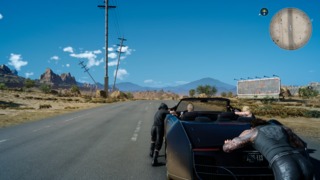
I could spend time talking about how clever the mechanics are, the beautiful mechanics applied to the day-night cycle, the amazingly clever trick of using maximum HP as a variable, the smoothness of the combat, the impact of the series’ summons--but they’re all not relevant.
Final Fantasy is defined by people navigating a world of crystals and monsters and magic and gods, but roadtrips are defined by the people you travel with, the stops you make, and the stories you experience during the trip. Final Fantasy XV spares no effort to let the player feel the moments that matter, and the moments that matter aren’t the enormous set-pieces or towering monsters. It’s the pat on the back when someone stumbles, the jokes that are snarky but never at the expense of someone, and the frank conversations only four people entirely comfortable with each other can have. When your party rests at a camping site, you can choose a meal that offers stat boosts. Not only are there an obscene number of beautifully rendered meals to choose from, they’re rendered to the point of applying different physics to the food based on its consistency. It’s such a small detail, but it does so much to sell the trip.
This game is the best. Final Fantasy XV aimed to retain the soul of a Final Fantasy game, while breaking from the disappointments many felt with recent installments in the series--to reclaim the Throne as the best JRPG. The result is a fresh, unique, courageous, and confident game with a flavor of fantasy I’ve never seen before.
Favorite touch: The way Final Fantasy XV turned “Max HP” into a variable that’s central to most of its systems. When your characters "die", they don’t faint, instead going into a highly limited "Danger" state. While in Danger, your maximum HP slowly drains, and any damage you take is instead deducted from your maximum HP. Characters in danger can be healed with potions or rescued by party members, but if your maximum HP reaches zero, the character faints. At the end of battles, your HP fills back up to its current maximum, but your maximum HP remains lowered--which can be recovered by making camp (and later on, elixirs). At camp, your gained experience points get tallied and you can make a meal for a stat boost for the next expedition, thus tying back into the whole road trip. I just love it when a small system does so much.
Least favorite thing: The second half of the game accelerates and decelerates the game in so many strange and unique ways that it’s bound to cause controversy, but I loved it. My main complaint was that the trope of ‘the maze with the maniacal narrator’ returns in FFXV, and while it does a great job of emphasizing the bleakness the scene is meant to evoke, it probably poses the weakest moment in the game on all accounts.
Alternatively: In a year where Battlefield 1 and Call of Duty: Infinite Warfare both delivered some of the best FPS campaigns in recent memory, it’s almost surprising that both were easily outclassed by id’s DOOM. Blendo Games’ Brendon Chung--one of my favorite designers--summarized the game in a tweet: “Doom 2016 feels like it had one design pillar: is it speed metal?”
Best AAA Game: Titanfall 2 (XB1, PS4, PC)
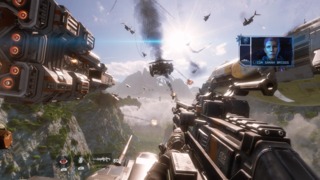
2016 felt like a return to form for the FPS genre. In the gorgeous world of Titanfall, Pilots are elite soldiers capable of adapting quickly to any situation and any terrain, and their prowess on the battlefield is enhanced further when they are piloting their Titan. There’s an absurd level of comfort and confidence the developers show in that exact premise. There’s a fluidity in the movement that rivals Mirror’s Edge at times, as you wall-run, double-jump, and slide under and over obstacles while shooting your targets. But the real confidence shows in how the game uses entire mechanics for only a single mission, or sometimes even mere seconds, Titanfall never fails to throw you into a new situation to adapt to.
Favorite touch(es): Titanfall 2 uses pretty much every possible scenario in the game to squeeze more uses out of the remarkably simple main mechanics. From moving between realities to auto-headshots, from moving platforms to holo-arenas, from giant battlefields in your Titan to platforming puzzles as a Pilot. At the end of Titanfall 2 it’s hard to think of anything fun left to do with the mechanics.
Least Favorite: Where BT-7274’s character shines as an endearing execution of the ‘robot learning humanity’ trope, the protagonist of Jack Cooper could not be a more bland character if Respawn tried for it. It makes it hard to care for anything that happens to Jack, and it makes some of the later sequences in the game difficult to care about.
Alternatively: Remedy’s Quantum Break broke every expectation in delivering a game that was half game, half episodic television series. While much of the gameplay wasn’t particularly inspired, the integration between the media was so well done that immediately after finishing the game, I genuinely couldn’t remember which parts I'd played in-engine and which parts I'd watched in the real-life series. Mixed with the unique perspective-switching between protagonist and antagonist, Quantum Break managed to do something unique and interesting.
Best Multiplayer: Inversus (PS4)
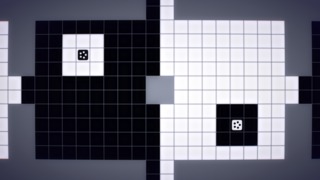
Inversus is an abstract two-to-four player versus game (online and local) in which players try to shoot each other. It is the cleanest distillation of minimalist versus design I’ve played in a long time. Players control a square that can move on tiles of their own color, and every bullet they fire (limited to vertical and horizontal directions), turns every tile it touches into a tile of the players’ color. There’s a charge shot, and a fast shot power-up, and that’s about it. The mechanics mix together into an incredible way, giving every shot such an opportunity cost that every shot matters in more ways than one.
Most Favorite: The way every split-second in the moment-to-moment gameplay is important enough that you could spend a minute discussing the optimal strategy. To make that level of strategic complexity available through a single analog stick and the four face buttons is remarkable.
Least Favorite: The levels in which Inversus keeps things focused on the moment-to-moment are phenomenal, but quite a few levels focus on wrapping and other mind-bending tricks to spice things up--and those levels often end up being the weakest part of the game.
Alternatively: Overcooked! is the most wonderfully chaotic cooperative multiplayer game I’ve played this year. It’s an adorable-looking game in which everyone simultaneously has to complete extremely simple tasks under absurd circumstances as you yell at your friends that the onion soup is overcooking while they’re yelling at you that you’re late with a tomato. I’m not sure if it’s a good time or a stressful time, but either way it’s memorable.
Best Emergent Territory: 1979 Revolution: Black Friday (PC, Android, iOS)
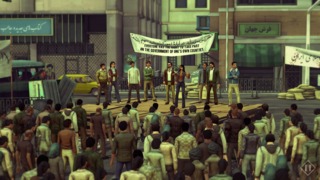
Part of my work is traveling around the world to find games that could never have been made in the traditional centers of the gaming world. This year, the winner is a bit of a cheat from my end, because iNK Stories is technically based in New York. But there’s no denying that 1979 Revolution: Black Friday shows how games can bridge the cultural gaps between countries. Black Friday is a tense, choice-driven adventure set in 1978 to 1980, the years around the Iranian Revolution. Throughout the game, players control an Iranian protagonist through a historically faithful representation of the situation in Iran at the time. Where other choice-based adventure games can be tense, 1979 Revolution adds an additional layer of intensity by proposing that the events in this story aren’t unlike those that actually happened.
Most Favorite: The main character is a pragmatic photographer that prefers to "choose no sides" in a politically confusing time. That allows the players--who might be completely unaware of Iranian history--to share the confusion and bewilderment of the main character as he gets caught up in the vortex of a political revolution.
Least Favorite: Sometimes, the game turns into a bit of a "click the pixel" exercise, something that--while it encourages you to look closely--also sometimes just feels ever-so-slightly broken.
Alternatively: I do also want to specifically point out ليلى و ظلال الحرب, or Liyla: Shadows of War, a Palestinian-made platformer game that, while somewhat crude in its delivery, is a perfect example of the power of games to communicate perspectives and stories through agency and immersion.
Best Atmosphere: Event[0] (PC)
I’ve always wondered what it’d feel like to be Dave in the HAL scene from 2001: A Space Odyssey, and Event[0] answered that question. In an abandoned spacecraft, you have no way of doing anything except for reluctantly working together with the spaceship’s AI, a dubious but apparently friendly computer system named Kaizen, accessible through chat terminals throughout the spaceship. The way you interact with the computer is entirely through chat, forcing developer Ocelot Society to reinvent first person movement and interaction to allow complete use of the keyboard for typing.
The most clever thing about the game is the inversion of reliance that only an interactive story could bring. In the real world, if Siri or Google or Alexa or Cortana doesn’t understand you, that’s an annoyance. In the world of Event[0], it can be the difference between life and death. By building itself around the "what if" of being reliant on a fallible system built with a different logic, Event[0] forces us to evaluate human-computer interaction and conflict, to think about what it means to exist, and to learn to communicate with something that isn’t like yourself--and eventually, maybe even trust them.
Favorite touch(es): Event[0] is full of magnificent little touches, but there’s a moment early on where the computer asks you to do it a favor by not moving into a room as it prepares it for you. It’s a simple way of world-building, and a way of establishing that both of you are reliant on each other, and that your ability to trust each other is going to be a factor in the game.
Least Favorite: There’s a single sequence in the game that is so extremely “video game”, a three-part fetch-quest, that it temporarily reminded me that I was playing a video game.
Alternatively: I have never played something like nilo’s Asemblance before. It’s a mix of Stanley Parable, Myst, and a psychological thriller. It’s a thing.
Best Whimsical: Stephen’s Sausage Roll (PC)

In Stephen’s Sausage Roll you roll sausages with an aerodynamic fork. It’s $30, has a terrible Steam page with a trailer that explains nothing, and the full text on the page is "a simple 3d puzzle game." It is what happens if Stephen Lavelle--one of the best puzzle designers in the world--decides Snakebird is a bit too easy, and The Witness is a good warm-up exercise.
Most favorite touch: The game has an absolutely redundant day-night cycle, that is just there to stare you in the face as it laughs at your failure.
Least favorite: After hours of sublime puzzling, the later puzzles feel less about understanding a mechanic, or finding a leap of logic, and more about keeping track of the logistics of executing a four-billion step sequence.
Alternatively: No Man’s Sky is a miracle. We can argue in circles about what it could’ve been, what it should’ve been, what it would’ve been, but let’s talk about what we got. What we got was a game that fulfilled its promise of every good screenshot being a sci-fi book cover. While there’s enough to criticize, I have enough great stories to tell from my 40-ish hours of No Man’s Sky that I easily consider the game a success.
Best Mobile: Clash Royale (iOS, Android)
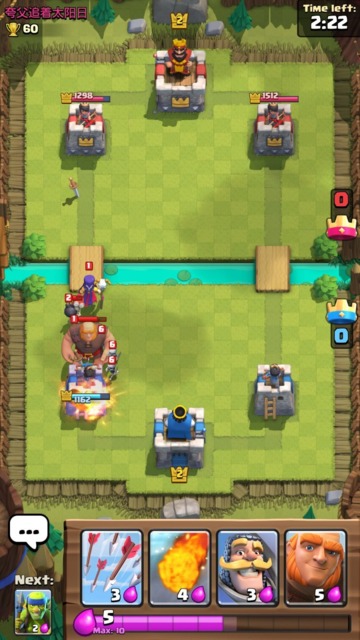
Only four days into 2016, Clash Royale became my favorite mobile game ever. It was cemented at that top spot for almost the entire year. The sublime Reigns made a huge leap for the spot, but fell short in the endgame. Pokémon Go deserves a mention but not an award. It wasn’t until Ridiculous Fishing collaborator Zach Gage released Really Bad Chess that I thought I had found a game that could replace Clash Royale. But ultimately, even Really Bad Chess’ brilliance couldn’t topple Clash Royale’s simplified MOBA. The tiniest details in the design give the game an enormous amount of depth, and the entire game is built in such a way that it remains fun for months, even without paying.
Favorite touch(es): The brilliance of how variable a spawned unit’s performance is depending on their placement. Even the tiniest change in placement can fully change how a unit functions, while never actually changing any variables or functionality in the units. It’s simple, it’s intuitive, it’s a skill to master, it’s a sight to behold for someone who loves good design.
Least Favorite: Eventually, you do hit that paywall. It might be months into the game, eventually the progression curves even out at a point where the only way forward is through your wallet. I can barely fault the game for that, and I’ll happily admit I bought some gems to thank Supercell for hundreds of hours played.
Alternatively: Reigns is a Tinder-esque interface-meets-kingdom management sim. It’s fiendishly clever, and even though it eventually overstays its welcome, the experience is positive enough that Reigns is easily one of the most interesting mobile games ever created.
Best B-Game: Devil Daggers (PC)
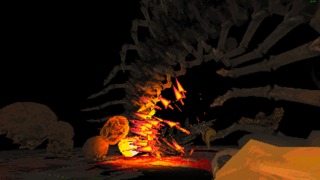
Devil Daggers is first person shooters at its most pure. It’s a game about dodging, jumping, shooting, and combining those three. The goal is to grab the titular Devil Dagger, and survive the demon onslaught that results as long as possible. You will die. If you’re pretty good, you’ll last 30 seconds to a minute or two. If you last for 8 and a half minutes, you beat the game. If you’re the world record holder, you’ll maybe last for almost ten minutes. It’s simple, it’s tense, no pretense, tightly scripted, all gameplay. It also has some of the best audio design I’ve ever come across in a game.
Favorite touch(es): Devil Daggers looks like the most simplistic FPS in years, but it is remarkably complex. There’s reload through the gems only coming to you when you’re not shooting. There’s shoot-‘em-up in crowd management. There’s FPS in the enemy weak spots. There’s level design in the enemy spawns. There’s weapon management and crosshair leading and strafing and bunny hopping and rocket jumping. Devil Daggers is more FPS than most blockbusters will ever be able to claim.
Least Favorite: A useful trope of shoot-‘em-up design, the “shotgun” in Devil Daggers feels like it prefers ‘active clicking’. If you hold the mouse button, it fires slightly slower than if you rapidly click the mouse button--which is both tedious and stressful for player hands--not to mention near-impossible for people with disabilities or pain in their hands that could otherwise still get a perfect run. In design, it’s always worth looking at the costs and benefits any choice has, and active clicking has such a minor effect on the skill ceiling, feel, or gameplay, that I don’t feel it’s worth it.
Alternatively: Duskers sets itself up to be the ultimate B-game. Sci-fi drones being remote controlled through a console interface and a visual representation that would’ve made '90s hacker movies proud. Poke just beyond that, and you’ll find a remarkably deep game with layers of existential crisis and terror. The way it should be, really.
Best Indie: Thumper (PS4, PC)

Thumper describes itself as a “violent rhythm action game”. I’ve been trying to come up with a better way to describe it, but I can’t. Thumper is like boxing with music if music was twice your size and twice your speed. Thumper is Audiosurf if Audiosurf had only custom-written tracks and wanted to hurt you. Thumper is like bringing a Guitar Hero guitar to a Vanquish fight. It’s intense, relentless and oppressive. It is overwhelming on a screen, and all-consuming in VR.
Most Favorite: The way the obstacles’ play sound effects twice, once for the obstacle to appear and one for the obstacle to be passed, while entirely fitting the flow and track of the music.
Least Favorite: The first few levels of Thumper are entirely accessible, while remarkably challenging. They play with reflex, flow, and music. The latter levels of Thumper feel remarkably less interesting for their almost cruel pacing and mechanics, although some of the best sequences in the game outside of the sublime first world can be found near the end.
Alternatively: I didn’t like Limbo. Limbo was that game that felt like it was trying to be a thing, but Playdead just couldn’t push itself to make it. It’s the bear traps, you know. You see, in Limbo, part of the journey was death--powerful, grotesque deaths. But at no point did the deaths feel meaningful, because in many cases they were trial and error. A walk through a forest had a bear trap in the middle of it, and while it was shocking and interesting the first time, dying just stopped having meaning and kept the puzzles from having room to breathe. Inside sees Playdead with both the guts and the experience to create what Limbo wanted to be. A game where death is avoidable, where the puzzles breathe, where a walk through a cornfield is just that.
Best …: That Dragon, Cancer
There were so many brilliant games that I wanted to give a mention, that I just didn’t have the space for. I spend a full month on this list, shifting things around and rewriting things, and in the end I’m quite comfortable with what ended up on this list.
I do still regret not being able to include gems like the instant classic of The Last Guardian, where classic is both a positive and a negative. There’s no mention of the phenomenal Picross 3D: Round 2, or the lovely Soft Body, the deep-dive that is Imbroglio, the brutal style of House of the Dying Sun, or the chaotic laughter in Flat Heroes. There was no space for Hyper Light Drifter, Oxenfree, Virginia, Pony Island, Killing Time at Lightspeed, or Civ VI. I couldn’t make space for the worthy sequels of Dishonored and Watch Dogs, which both improved tremendously on games that were already noteworthy. There’s no mention of the behemoth undertaking that was Owlboy, a game that was in production before Fez or Super Meat Boy were ideas, and before I joined this beautiful industry.
Ratchet & Clank didn’t make it despite being a lovely modern take on the classic 3D platformer. Notably, both Gears of War 4 and Uncharted 4 managed to surpass their series’ high points, the 2nd games in their respective installments.
Destiny: Rise of Iron is forever going to be one of the most impactful games I’ve ever played played, although that might’ve been affected by the fact that my fiancée proposed through the game. With the help of the folks at Bungie, she had a custom ring artefact, a letter, and a (now-public) Proposal emote modeled, mo-capped, and hidden in the game. It helps that Rise of Iron has some of the best Destiny content in it, and if you’ve read my previous lists, you know that I’m a huge fan of the game.
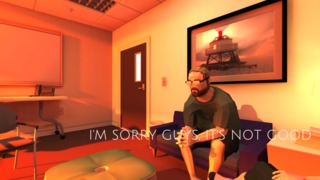
This last category is my crutch, my way of giving an award to a game that deserves it that doesn’t fit the other categories. This year, there really can’t be any other game than That Dragon, Cancer. A beautiful tribute to a real human life, Joel Green, That Dragon, Cancer is the surest confirmation yet that genuine games have an unparalleled ability to communicate experiences and perspectives. It takes a lot of confidence to make a game, because you tend to become personally attached to what you create. I once led a Q&A panel with the creators of the game after the Making Of-documentary Thank you for Playing screened at PAX, and it was one of the most emotionally distressing things I’ve done in my life. The amount of grace, care, and love that the team has despite the emotional investment of making a game about a child you lost is unparalleled, and sincerely awe-inspiring. In not holding back, the game offers a stunningly emotional insight into a family dealing with hope, despair, faith, mortality, life, death, and more than anything, love.
Favorite Touch(es): Ryan and Amy Green, Joel’s parents, are devout Christians. Instead of shying away from that, they incorporated their faith into the game. It is such an uncommon perspective to see religion in a game as anything but a narrative motivation for an antagonist, that a human exploration of it can easily catch you off-guard.
Least Favorite: That Dragon, Cancer’s gameplay can feel somewhat clunky at times, which can get in the way of your connection to the narrative at unfortunate moments.
Alternatively: Firewatch is beautifully written, gorgeously crafted, and a masterclass in making things that are painfully human.


